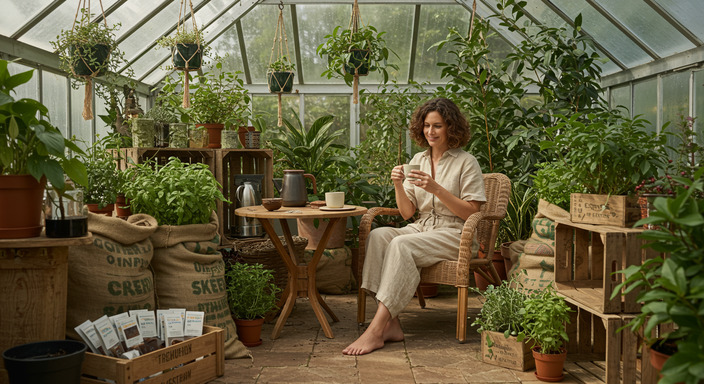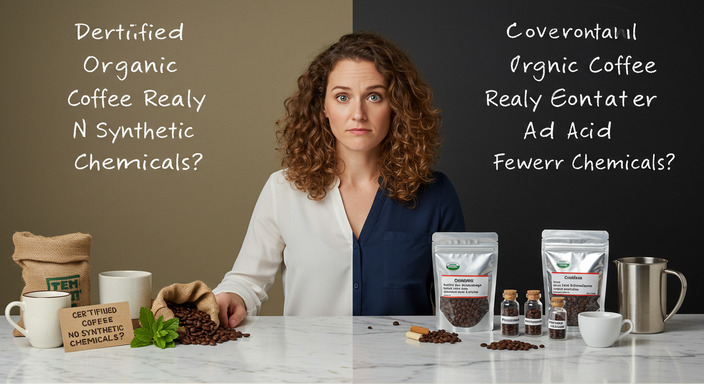
Understanding Organic Coffee: A Guide to Healthier and Eco-Friendly Choices

Table of Contents
ToggleWhat is Organic Coffee?
Organic coffee is more than just a trendy buzzword—it’s a commitment to sustainability, health, and ethical farming practices. At its core, organic coffee is grown without the use of synthetic chemicals like pesticides, herbicides, or fertilizers. Instead, farmers rely on natural methods to nurture the soil, protect the environment, and produce a cleaner, more flavorful cup of coffee.
Definition of Organic Coffee
Organic coffee is defined by the way it’s cultivated, processed, and certified. To be labeled organic, coffee must meet strict guidelines from planting to packaging. This includes:
- Chemical-Free Farming: No synthetic pesticides, herbicides, or fertilizers are used in the growing process.
- Soil Health: Farmers focus on maintaining soil fertility through composting, crop rotation, and other natural techniques.
- Sustainable Practices: Organic farming prioritizes biodiversity, water conservation, and eco-friendly methods.
Certification and Standards
To ensure coffee is truly organic, it must be certified by a recognized authority. In the U.S., the USDA Organic label is the gold standard. This certification requires:
- Third-Party Verification: Farms and processing facilities are inspected by independent organizations to ensure compliance.
- Traceability: Every step of the supply chain—from farm to store—must be documented and transparent.
- Annual Audits: Certified producers must undergo regular reviews to maintain their organic status.
These rigorous standards help protect consumers, support farmers, and preserve the planet—making organic coffee a choice you can feel good about.
Benefits of Organic Coffee
Health Advantages for Consumers
Organic coffee is more than just a beverage—it’s a healthier choice for your body. Because it’s grown without synthetic pesticides, herbicides, or chemical fertilizers, organic coffee reduces your exposure to harmful substances. Studies suggest that organic coffee contains higher levels of antioxidants, which help fight inflammation and support overall health. Additionally, it’s often free from mold and mycotoxins, which can sometimes be present in conventionally grown coffee due to improper storage or processing. For those with sensitive stomachs, organic coffee is often easier to digest because it avoids the harsh chemicals used in non-organic farming.
Environmental Impact of Organic Farming
Choosing organic coffee isn’t just good for you—it’s good for the planet. Organic farming practices prioritize sustainability by avoiding synthetic chemicals that can harm soil, waterways, and wildlife. Instead, farmers use natural methods like composting, crop rotation, and shade-grown techniques to maintain soil health and biodiversity. Shade-grown coffee, a common organic practice, helps preserve forests and provides habitats for birds and other wildlife. By supporting organic coffee, you’re contributing to:
- Healthier ecosystems
- Reduced water pollution
- Lower carbon footprints
These practices not only protect the environment but also ensure that coffee farming remains sustainable for future generations.
“Organic coffee farming is a commitment to the earth and its people—one cup at a time.”
How Organic Coffee is Grown
Natural Farming Practices
Organic coffee is cultivated using methods that are in harmony with nature. Farmers rely on sustainable techniques that enrich the soil, conserve water, and protect biodiversity. These practices include:
- Crop rotation: Alternating coffee plants with other crops to maintain soil fertility and reduce the risk of pests.
- Shade-grown coffee: Growing coffee under the canopy of trees, which provides a habitat for wildlife and prevents soil erosion.
- Composting: Using organic materials like coffee pulp and plant matter to create natural fertilizers that nourish the soil.
By prioritizing these methods, organic coffee farming supports ecosystems and promotes long-term agricultural health.
Avoiding Synthetic Pesticides and Fertilizers
One of the core principles of organic coffee farming is the exclusion of synthetic chemicals. Instead of relying on artificial pesticides and fertilizers, farmers use natural alternatives to protect their crops and maintain soil quality. For example:
- Natural pest control: Introducing beneficial insects or using plant-based repellents to manage pests without harming the environment.
- Organic fertilizers: Applying compost, manure, or other natural substances to supply essential nutrients to the soil.
This approach not only reduces the environmental impact of farming but also ensures that the coffee beans are free from harmful chemical residues, making them a healthier choice for consumers.
By embracing these practices, organic coffee farmers contribute to a more sustainable and ethical food system, while delivering a product that is truly natural and wholesome.
The Ethical Side of Organic Coffee
Fair Trade and Farmer Support
When you choose organic coffee, you’re not just making a healthier choice for yourself—you’re also supporting fair trade practices that prioritize the well-being of coffee farmers. Fair trade ensures that farmers receive a fair price for their crops, which helps them cover the costs of sustainable farming methods and provides a stable income. This is especially important in regions where coffee farming is a primary source of livelihood.
By opting for fair trade organic coffee, you’re contributing to:
- Better wages and working conditions for farmers
- Investment in community development projects, such as schools and healthcare
- Empowerment of small-scale farmers to compete in the global market
This ethical approach ensures that the people who grow your coffee are treated with dignity and respect, creating a more equitable coffee industry.
Promoting Sustainable Livelihoods
Organic coffee farming goes hand in hand with sustainable livelihoods. By avoiding synthetic pesticides and fertilizers, farmers protect their health and the environment, ensuring that their land remains fertile for future generations. This sustainable approach also reduces the financial burden on farmers, as they rely on natural methods rather than expensive chemicals.
Here’s how organic coffee supports sustainable livelihoods:
- Encourages biodiversity by preserving natural ecosystems
- Reduces exposure to harmful chemicals for farmers and their families
- Promotes long-term soil health, ensuring continued productivity
When you sip a cup of organic coffee, you’re not just enjoying a delicious beverage—you’re supporting a system that values people and the planet equally.
How to Choose the Best Organic Coffee
Reading Labels and Certifications
When selecting organic coffee, the label is your first clue. Look for USDA Organic certification, which ensures the coffee is grown without synthetic pesticides, herbicides, or fertilizers. Additionally, certifications like Fair Trade or Rainforest Alliance indicate ethical farming practices and environmental sustainability. These labels not only guarantee quality but also support fair wages and eco-friendly farming methods.
Here’s what to check on the label:
- Organic Certification: The coffee meets strict organic standards.
- Fair Trade: Ensures farmers are paid fairly.
- Shade-Grown: Indicates biodiversity-friendly farming.
- Single-Origin: Coffee sourced from one region, often with unique flavor profiles.
Tips for Buying Quality Organic Coffee
Choosing the best organic coffee goes beyond certifications. Here are some practical tips to ensure you’re getting a high-quality product:
- Whole Beans vs. Ground: Opt for whole beans whenever possible. They retain freshness and flavor longer than pre-ground coffee.
- Roast Date: Check the roast date on the packaging. Fresher coffee offers a more vibrant and nuanced taste.
- Flavor Profile: Consider your taste preferences. Light roasts highlight acidity and fruitiness, while dark roasts offer bold, rich flavors.
- Packaging: Look for coffee packaged in airtight, resealable bags to maintain freshness.
- Support Local Roasters: Buy from small, local roasters who often prioritize quality and sustainability.
Remember, the best organic coffee is one that aligns with your values and tastes. Take your time to explore different options and enjoy the journey of discovering your perfect cup!
Brewing the Perfect Cup of Organic Coffee
Best Brewing Methods for Organic Coffee
When it comes to brewing organic coffee, the method you choose can significantly impact the flavor and overall experience. Here are some of the best methods to bring out the natural richness of organic coffee:
- Pour-Over: This method allows for precise control over the brewing process, ensuring a clean and flavorful cup. It’s perfect for highlighting the nuanced notes of organic beans.
- French Press: Known for its full-bodied results, the French Press is ideal for those who enjoy a robust and rich coffee. It’s also simple and eco-friendly, requiring no paper filters.
- AeroPress: A versatile and portable option, the AeroPress can produce a smooth and concentrated brew in just minutes, making it a favorite among coffee enthusiasts.
- Cold Brew: For a refreshing and low-acidity option, cold brewing is a great choice. It’s easy to make and perfect for hot summer days.
Enhancing Flavor Naturally
To truly savor the unique flavors of organic coffee, consider these natural ways to enhance your brew without relying on artificial additives:
- Use Freshly Ground Beans: Grinding your beans just before brewing ensures maximum freshness and flavor. Invest in a good-quality grinder for the best results.
- Opt for Filtered Water: Since coffee is mostly water, using filtered or spring water can make a noticeable difference in taste.
- Experiment with Brewing Time and Temperature: Adjusting these factors can help you find the perfect balance for your preferred flavor profile. For example, a slightly lower temperature can reduce bitterness.
- Add Natural Sweeteners: If you enjoy a touch of sweetness, try using honey, maple syrup, or coconut sugar instead of refined sugar.
- Incorporate Spices: A pinch of cinnamon, cardamom, or nutmeg can add depth and warmth to your coffee without overpowering its natural taste.
By choosing the right brewing method and enhancing flavors naturally, you can enjoy a cup of organic coffee that’s not only delicious but also aligned with your values of sustainability and health.
Why Organic Coffee Matters for the Future
Long-Term Sustainability
Choosing organic coffee isn’t just a trend—it’s a commitment to the planet’s future. Conventional coffee farming often relies on synthetic pesticides and fertilizers, which can degrade soil health, pollute water sources, and harm local ecosystems. In contrast, organic coffee is grown using methods that prioritize long-term sustainability. Farmers cultivate coffee in harmony with nature, preserving biodiversity and ensuring that the land remains fertile for generations to come.
By supporting organic coffee, you’re helping to reduce the environmental footprint of your morning brew. Organic farming practices promote healthier soil, which absorbs more carbon dioxide, contributing to the fight against climate change. Plus, organic farms often use shade-grown techniques, which protect bird habitats and maintain forest ecosystems.
Making a Difference with Every Cup
Every sip of organic coffee is a small but powerful way to make a positive impact. When you choose organic, you’re supporting farmers who prioritize ethical and sustainable practices. These farmers often work in cooperatives, ensuring fair wages and better working conditions for their communities. Your purchase helps create a more equitable global coffee industry.
Beyond the social benefits, organic coffee is also better for your health. Grown without synthetic chemicals, it’s free from harmful residues that can linger in conventionally grown beans. This means a cleaner, purer cup of coffee that’s as good for you as it is for the planet.
A Future Worth Brewing
Organic coffee represents more than just a beverage—it’s a movement toward a more sustainable and ethical world. By choosing organic, you’re voting with your wallet for practices that protect the environment, support farmers, and promote healthier living. Together, we can ensure that the coffee industry thrives in a way that benefits everyone, from the soil to the cup.
FAQ
- Why is organic coffee better for the environment?
Organic coffee farming avoids harmful chemicals, protects biodiversity, and promotes sustainable land use, reducing its environmental impact. - How does organic coffee support farmers?
Many organic coffee farms operate under fair trade practices, ensuring fair wages and improving community well-being. - Is organic coffee healthier?
Yes, organic coffee is grown without synthetic pesticides or fertilizers, making it a cleaner and safer choice for consumers.
is a writer and editor at Coffee With Finance, blending her love for coffee, personal finance, and visual storytelling. She crafts engaging articles, curates site images, and shares brewing tips, bean origins, and practical money advice. Anna believes that managing finances, like making great coffee, should be intentional and rewarding — bringing clarity, warmth, and beauty to every story she tells.




























Post Comment